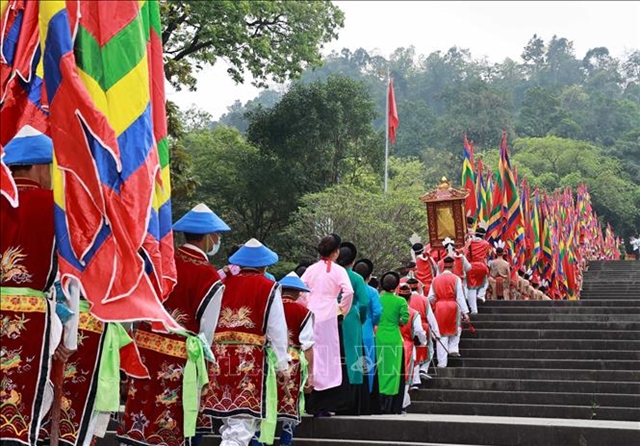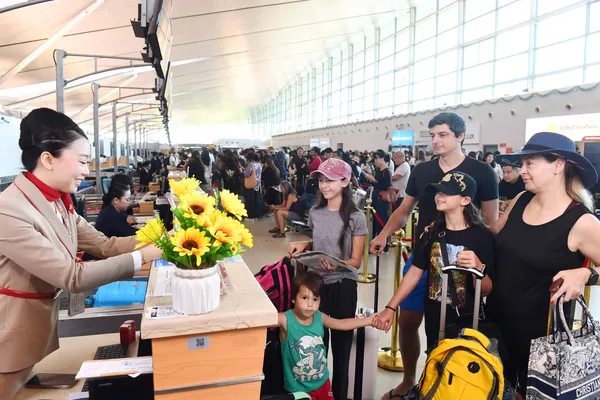 Brandinfo
Brandinfo

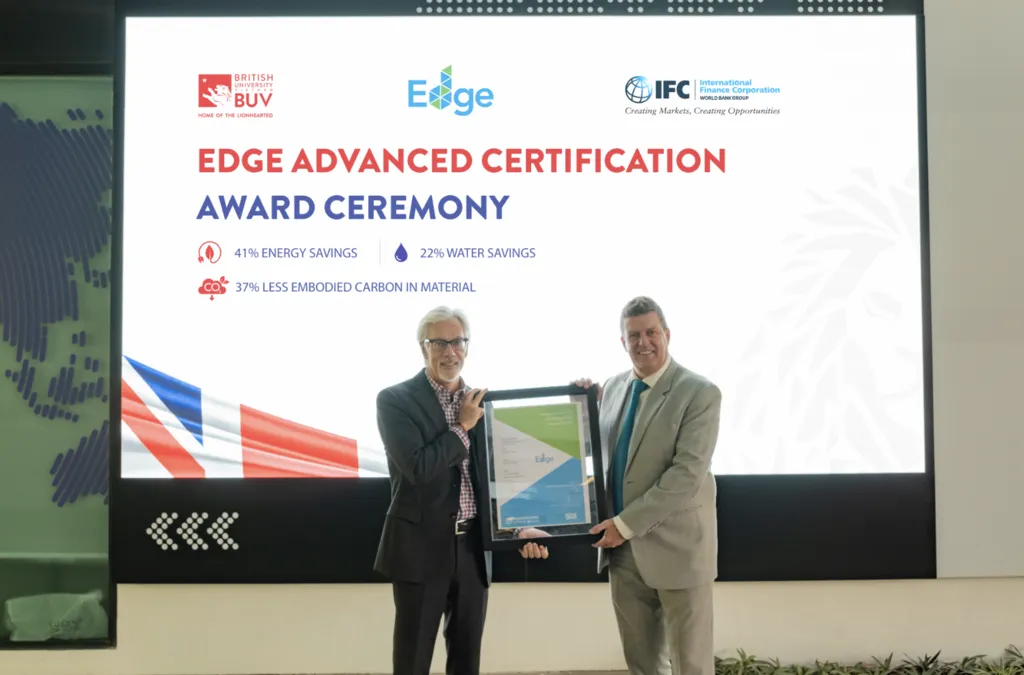 |
| Thomas James Jacobs, IFC Country Manager for Vietnam, Laos PDR, and Cambodia, awarded EDGE Advanced Certification to Professor Rick Bennett, BUV Deputy Vice-Chancellor and Vice President. |
Towards a green learning environment
Sustainable development has become a key goal in global education. UNESCO has set a target that, by 2030, 50% of schools in each country worldwide will become "green schools" — educational spaces that promote sustainability across various aspects such as curricula, infrastructure, and campus environments. In particular, countries most affected by climate change are increasingly recognising the importance of adopting green, efficient, and environmentally friendly educational standards.
In this context, the presence of reputable international green building certification organisations such as EDGE, LEED, and BREEAM plays a guiding role by providing accurate assessments of sustainability goals for various entities. Certifications like EDGE are often prioritised by developing countries, as the evaluation criteria are designed to focus on the benefits they bring to these markets.
Developed by the International Finance Corporation (IFC), EDGE evaluates building sustainability through various resource-related metrics. With support from the UK government and other development partners, EDGE certification is applied in 170 countries, with a strong presence in Asia.
On November 21, 2024, British University Vietnam (BUV) officially became the first university in Vietnam to achieve EDGE Advanced Certification, level 2 equivalent in the three-tier certification system. To attain EDGE Advanced Certification, buildings must ensure a minimum of 40% energy savings, double the basic EDGE-certified level, which is the benchmark for most EDGE-certified buildings in Vietnam.
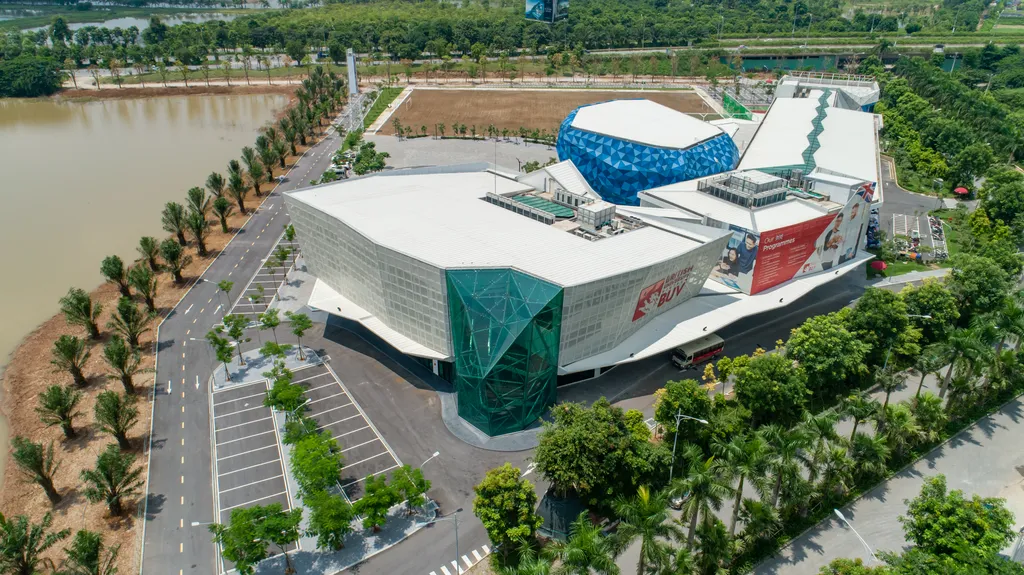 |
| Phase 1 of BUV receives EDGE Advanced Certification. |
According to the latest data, BUV has achieved impressive metrics, surpassing the EDGE Advanced Certification requirements. EDGE's evaluation recognises a 41% reduction in energy consumption at BUV, alongside a 22% saving in water use and 37% less embodied carbon in materials.
Pioneering sustainable development and carbon neutrality
To achieve impressive EDGE-certified resource-efficiency targets, the university has implemented numerous energy management solutions from the design intent through to actual construction. The campus master plan harmoniously combines building elements (which make up under 20%) with a regulating pond and green spaces to create environments that maximise natural energy use. The honeycomb-style exterior design allows natural light to penetrate communal areas while functioning as a natural cooling system, providing fresh air and reducing electricity consumption by approximately 20%. In common areas, BUV takes advantage of natural airflow by using ceiling fans instead of air conditioning.
The shading design for the building's hottest-facing sides, oriented towards the west and east, has been carefully considered for effective insulation. In addition, the lighting system at BUV uses only LED bulbs, saving 75% of energy compared to traditional incandescent bulbs.
According to EDGE's evaluation, the university has lowered its carbon footprint by approximately 196.27 tonnes of CO₂ each year, equivalent to nearly a 53% reduction in total annual emissions. BUV plans to install solar panels in 2026 to enhance sustainable energy use over the next 25 years.
The entire water system at BUV is designed for circulation, efficiently allocating water for varying needs — from drinking and domestic use to sanitation and irrigation — while minimising waste and ensuring hygiene. The university's wastewater and waste management systems are managed by leading sustainable solutions providers in Ecopark, ensuring minimal waste and chemical discharge into the environment.
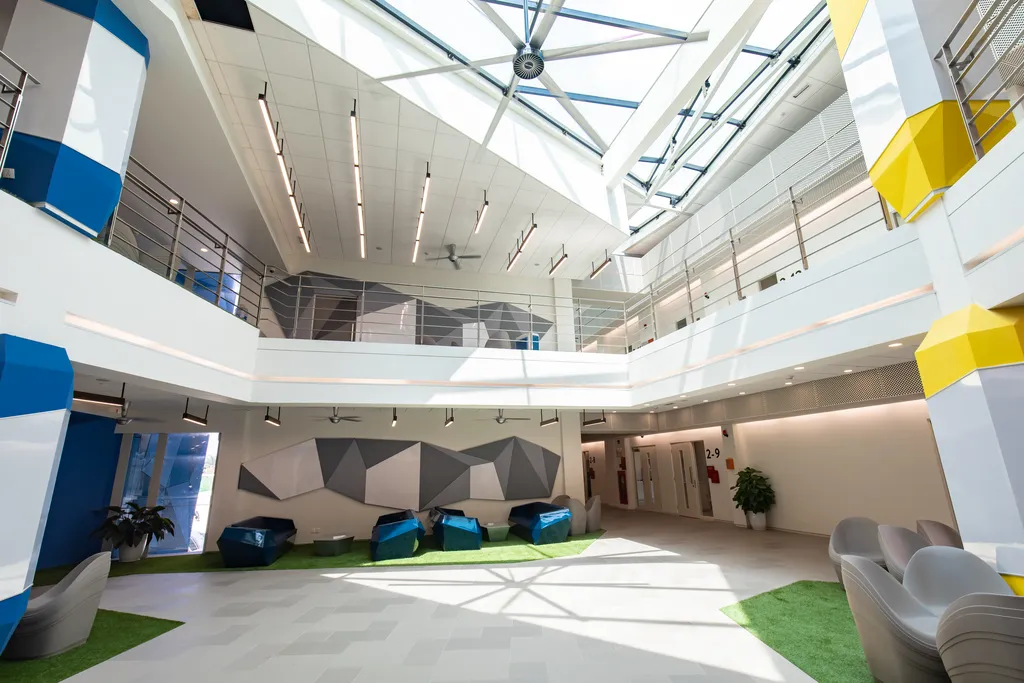 |
| Every corner of BUV is filled with natural light, fostering a wellness culture for students while reducing dependence on mechanical systems. |
In particular, BUV is one of the few universities in Hanoi and Vietnam that focuses on creating a space that is friendly to people with disabilities. From the parking lot and elevators with accessible control panels to restrooms and separate pathways, all are designed to ensure easy wheelchair access. The classrooms are also equipped with movable desks for students with disabilities.
Creating an inspirational model
Overall, BUV's Green Strategy has been carefully planned and implemented systematically before, during, and after the major investment in the training project in Vietnam. As a result, the university has made significant strides towards sustainability by integrating green principles into its architectural infrastructure, new developments, educational foundations, curricula, and extracurricular activities for students.
At BUV, sustainability is emphasised in every student activity, such as the celebration of Value Week in terms of sustainability and responsibility, and is also a core element of BUV’s exclusive Personal and Social Growth programme (PSG). Additionally, a sustainability mindset is one of the seven key attributes that graduates must acquire and master. This mindset is deeply embedded in the curriculum and every programme throughout students’ time at BUV.
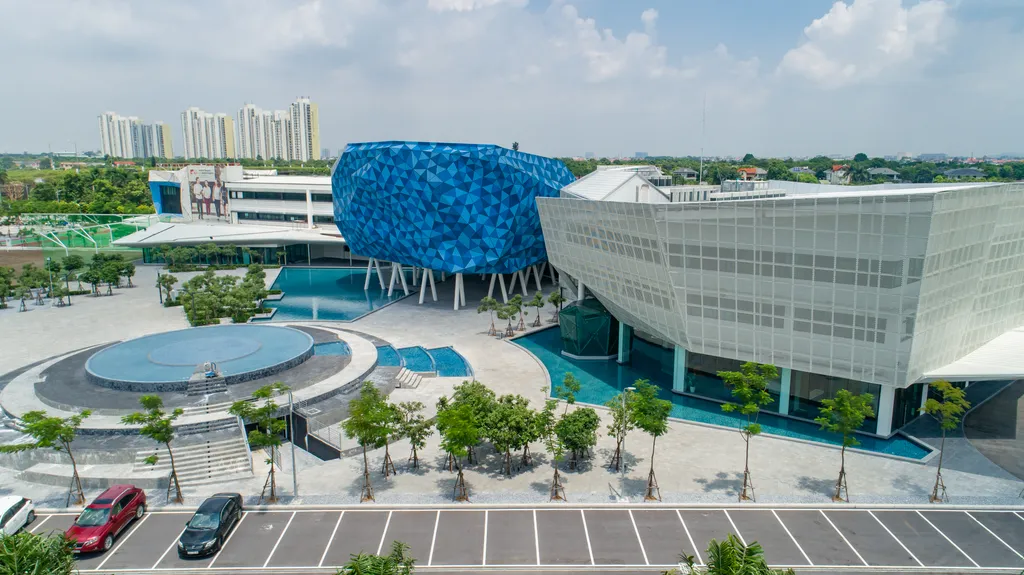 |
| The spacious campus ensures high-quality natural air circulation. |
Professor Rick Bennett, Deputy Vice-Chancellor and Vice President of BUV, said:
"Beyond being a place for the transmission of knowledge, a university is also an environment that shapes the awareness and responsibility of the youth. BUV, with our vision for a sustainable future for education in Vietnam, aims to create the most practical and positive model to inspire generations of students — talented young people who will play a leading role in the future environmental protection efforts of Vietnam. This is the latest step taken by BUV towards its goal of becoming one of the pioneering universities in Vietnam in 'carbon neutrality,' spreading the sustainability message to the wider community."
IFC Country Manager for Vietnam, Laos PDR, and Cambodia, Thomas James Jacobs, congratulated BUV for achieving a remarkable milestone in integrating green principles into its campus design and operations:
"This has created an environmentally friendly learning space, raised awareness, and encouraged green practices among BUV students and the wider community. For the past ten years, the IFC’s EDGE programme has actively engaged with both the public and private sectors in Vietnam to create an enabling environment and facilitate the adoption of green building standards. With the EDGE Advanced Certification for its Ecopark Campus Phase 1, BUV joins other climate leaders promoting green buildings in Vietnam, saving millions of kWh of energy and cubic metres of water annually and cutting down 100,000 tonnes of carbon dioxide each year. We look forward to continuing our green and sustainability work with BUV in the upcoming phases”.

.jpg)
